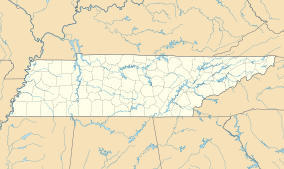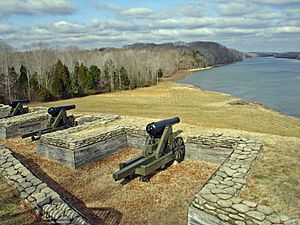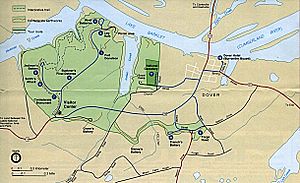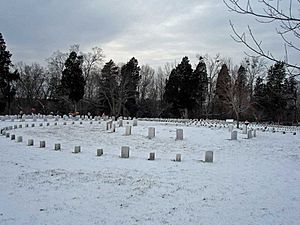Fort Donelson National Battlefield facts for kids
Quick facts for kids Fort Donelson National Battlefield |
|
|---|---|
|
IUCN Category III (Natural Monument)
|
|
| Location | Calloway County, Kentucky & Stewart County, Tennessee, USA |
| Nearest city | Dover, Tennessee |
| Area | 1,319 acres (5.34 km2) |
| Established | March 26, 1928 (War Dept.) August 10, 1933 (NPS) |
| Visitors | 208,687 (in 2005) |
| Governing body | National Park Service |
| Website | Fort Donelson National Battlefield |
Fort Donelson National Battlefield is a special place that helps us remember an important battle from the American Civil War. It protects two historic sites: Fort Donelson and Fort Heiman. These forts were key during the Forts Henry and Donelson Campaign in 1862.
During this campaign, Union Army General Ulysses S. Grant and Navy leader Andrew Hull Foote led their forces. They captured three forts belonging to the Confederate side. This victory gave the Union control of the Tennessee River and the Cumberland River. These rivers were like highways for moving troops and supplies.
The Union leaders became famous for these wins in February 1862. They were the first big successes for the Union in the war. Taking Fort Donelson also led to the capture of Nashville, Tennessee's capital. Nashville stayed under Union control until the war ended. This was a huge setback for the Confederacy early in the conflict.
The main part of the park is in Dover, Tennessee. It marks where the Battle of Fort Donelson happened. Fort Heiman is nearby in Calloway County, Kentucky. It was a Confederate fort used during the Battle of Fort Henry.
Contents
The Story of Fort Donelson
Why Forts Were Built
The state of Kentucky was a weak spot for the Confederate defense. The Tennessee and Cumberland rivers flowed through Kentucky. These rivers could be used by the Union to invade the South. Kentucky had said it was neutral, meaning it wouldn't pick a side. So, the Confederacy couldn't build forts there.
However, many people in western and central Kentucky supported the Confederacy. This allowed the Confederates to plan defenses just inside the Tennessee border.
Building the Forts
In May 1861, two engineers, Adna Anderson and William F. Foster, started looking for good spots. They needed places along the Cumberland River to build defenses. They found high ridges and deep valleys near the Kentucky border.
Anderson designed the water battery for Fort Donelson. This part of the fort was built on the west bank of the river, about 12 miles (19 km) from Kentucky. The fort was named after Confederate General Daniel S. Donelson. Construction began with many workers from a nearby iron works.
How the Park Was Created
From Military Park to Battlefield
The site first became Fort Donelson National Military Park on March 26, 1928. A national military park helps preserve important battle sites. In 1933, the park and its national cemetery were put under the care of the National Park Service. This is the group that manages many of America's national parks.
The park was added to the National Register of Historic Places in 1966. This list helps protect important historical sites. In 1985, its name changed to a national battlefield.
Growing the Park
In 2004, the park's size was allowed to grow from about 552 acres to 2,000 acres (8.1 km2). Then, in 2006, Calloway County gave the Fort Heiman site to the Park Service. Fort Heiman had also been recognized as a historic place in 1976.
Visiting the Park Today
The park today protects much of the original battle area. You can still see the river batteries and what's left of the fort. However, some parts of the battlefield are now private land with homes.
The Cumberland River was dammed in the 1960s. This created Lake Barkley, which covers an area similar to the river during the battle. Groups like the American Battlefield Trust have helped save more land. They have added about 368 acres (1.5 km2) to the park.
Fort Donelson National Cemetery
The Fort Donelson National Cemetery is a special burial ground within the park. It covers about 15 acres (62,080 m2). In 1867, the remains of 670 Union soldiers were moved here. Many veterans from other wars are also buried there. The cemetery is not currently open for new burials.
 | Mary Eliza Mahoney |
 | Susie King Taylor |
 | Ida Gray |
 | Eliza Ann Grier |






